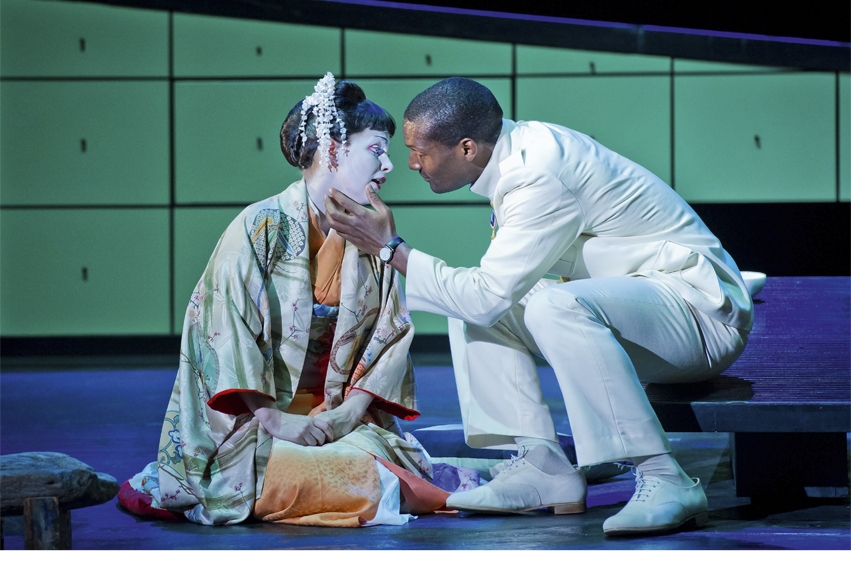Street Scene may well be Kurt Weill’s most successful work from his American period, but seeing it in as good a production as the Opera Group’s at the Young Vic was cause for both enjoyment and reservations. In the next couple of weeks it will be touring to Basingstoke, Edinburgh, Newcastle and Hull, so plenty of people will have and should take the chance of seeing it. I’d go again if I were nearer one of those places, for Weill is always at least interesting, though not always quite in the way that he wanted to be — he intended, like Brecht, that we should be filled with indignation about many of the scenes he presents, but we’re much more likely to be beguiled by catchy melodies. Elmer Rice and Langston Hughes, the rather leaden librettists of Street Scene, only intermittently led Weill to bring characters to life, or to create atmosphere.
The work begins and ends with complaints about the heat — actually, the Young Vic was extremely well air-conditioned — but nothing in the music or the action gets that across. The impressions of tenement life are more of a swarming ant-heap. Still, the performance was on a decent to high level, the unquestioned star being Elena Ferrari as Anna Maurrant, an adorable middle-aged woman married to a slob and tempted into an affair with Sankey the milkman; the slob murders them both. The pervasive feeling is one of longing to get out to something better, most movingly realised by the bookish Sam Kaplan, played here with heroic lack of sex appeal by Paul Curievici, whose relationship with Anna’s daughter Rose comes close to being the work’s centre. I don’t know how to put my frustration precisely, and I don’t think it was the production’s fault. That the ‘Life goes on’ element in the work is not as redeemed from banality as it needs to be is the nearest I can get.
A revival of Madama Butterfly may not seem worth mentioning, but in fact Opera North’s production by Tim Albery is so extraordinarily powerful that I must urge it on anyone who would normally feel that Butterfly deserves to be called an ‘infamous love story’, as I saw it described in one of the weekend supplements a few days ago. Everything about this show is fresh and intense, and my only criticism is that someone, presumably the extremely gifted young conductor Daniele Rustioni, decided on a weird amalgam of the original Milan version of 1904 and the later Paris one of 1906, the latter being what we are used to. Besides being treated to an unnecessary and musically inferior addition to the love duet, we were deprived of Pinkerton’s aria of remorse, while Kate Pinkerton’s role, admittedly tiny in the familiar version, was enlarged by giving her some of Butterfly’s most harrowing music, including ‘triste madre!’ In 11 pages of densely printed commentary, the programme makes no mention of this, which is culpable.
Even so, the performance I went to, the third, was virtually flawless, and was remarkable among other things for introducing Noah Stewart, a young African-American singer who already sports a website and a blog and regularly twitters. He also sings beautifully, though his voice is so richly baritonal that some of his top notes were a stretch; and his acting is wonderfully relaxed and natural. Pinkerton is a much maligned character, but surely no worse than most men would be in his position; and Stewart makes him enchanting, even while his is the most vulpine portrayal I have seen: when he learns that Butterfly is 15 he leaps with excitement. And lots of things about Japan make him double up with mirth. In the love duet as he sings it, tenderness and lust collaborate just as they do in Puccini’s tumescent music.
Anne Sophie Duprels sang in the original production, but she is still finer now, more detailed in her characterisation, and also living the role to the point when I sometimes could hardly bear to look. This Butterfly is so alert and alive, so happy to be blinkered, that she has one questioning the merits of prudence and thoughts of probability, as presented by Sharpless, whose music is as lovely as any in this score, but ineffectual. The inane cries of ‘What a pity!’ that the other characters voice in the final scene are beside the point in the face of the enlargement of her personality that Butterfly shows as she comes to full realisation of the truth. Suffering on this scale of intensity and grandeur places her with the greatest tragic heroines, and I have never seen that made so conclusively clear as by Duprels, though I have heard it, often, in the stupendous recording of the work which Callas made.






Comments